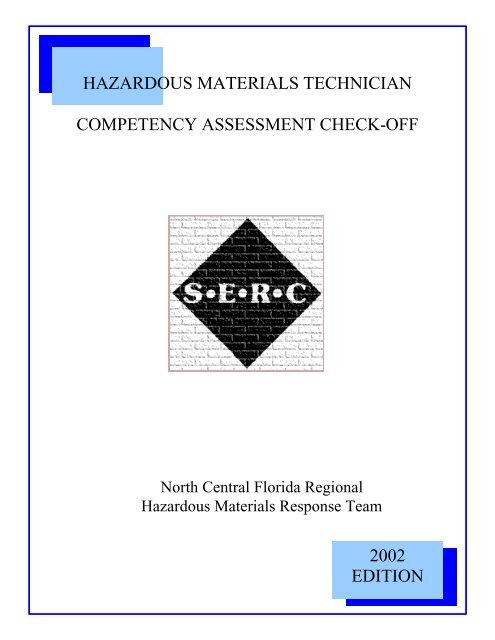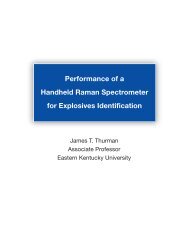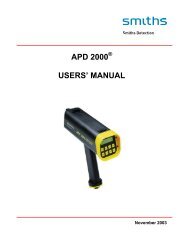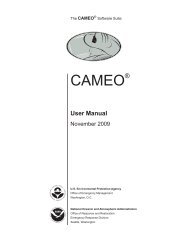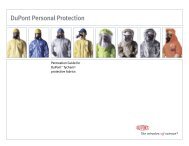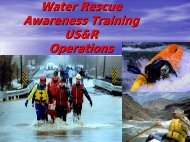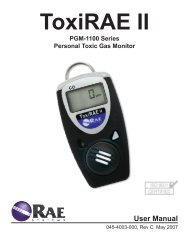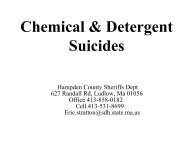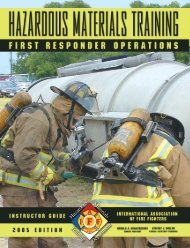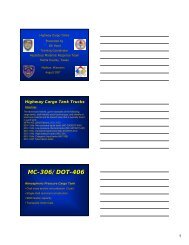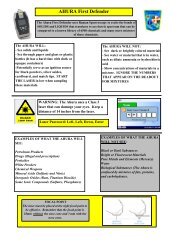Comprtrncy checklist for hazmat.pdf - Livonia Professional Firefighters
Comprtrncy checklist for hazmat.pdf - Livonia Professional Firefighters
Comprtrncy checklist for hazmat.pdf - Livonia Professional Firefighters
You also want an ePaper? Increase the reach of your titles
YUMPU automatically turns print PDFs into web optimized ePapers that Google loves.
HAZARDOUS MATERIALS TECHNICIAN<br />
COMPETENCY ASSESSMENT CHECK-OFF<br />
North Central Florida Regional<br />
Hazardous Materials Response Team<br />
2002<br />
EDITION
Introduction<br />
This document has been developed to provide guidance <strong>for</strong> regularly scheduled<br />
competency maintenance of Hazardous Materials Technicians. The psychomotor<br />
skills found in the competencies outlined in NFPA 472, OSHA 29CFR1910.120<br />
and the Florida State Emergency Response Commissions Public Sector<br />
Hazardous Materials Training Guidelines have been brought together in a series<br />
of five operational sections totaling 107 per<strong>for</strong>mance based skills.<br />
This document is recommended <strong>for</strong> initial training of technicians as well as<br />
documentation of periodic maintenance. In accordance with OSHA 29 CFR<br />
1910.120(q), the employer is responsible <strong>for</strong> designating appropriate recertification<br />
procedures and the identifying the necessary qualification of those<br />
authorized to sign this document indicating successful completion of a<br />
competency. Those authorized signers should enter the necessary in<strong>for</strong>mation<br />
in Appendix 1 to properly cross-reference their signature.<br />
Prepared For:<br />
The North Central Florida Regional Hazardous Materials Response Team<br />
2009 Northwest 67 th Place, Suite A<br />
Gainesville, Florida 32653-1605<br />
Phone: 352-955-2200<br />
Funded By:<br />
Florida Department of Community Affairs<br />
Division of Emergency Management<br />
2555 Shummard Oaks Blvd.<br />
Tallahassee, Florida 32299<br />
Contract # 02CP-10-12-00-20-115<br />
Prepared By:<br />
2135 West Leewynn Drive • Sarasota, Florida 34240<br />
Phone: (941) 928-4056 • Fax: (941) 378-2478<br />
Copyright © 2002 North Central Florida Regional Hazardous Materials Response Team
Copyright © 2002 North Central Florida Regional Hazardous Materials Response Team<br />
This document has been developed by the North Central Florida Regional Hazardous<br />
Materials Response Team and the Florida Department of Community Affairs - Division of<br />
Emergency Management. It is intended to aide public sector employers with maintaining the<br />
training requirements of Hazardous Materials Technicians. This document may be duplicated<br />
only in its entirety <strong>for</strong> non-profit training of public sector responders. Any commercial or “<strong>for</strong>profit”<br />
reproduction of this program without the advanced written permission of the Florida<br />
Department of Community Affairs is strictly prohibited.
Table of Contents<br />
Section 1: Incident Command<br />
1.1 Roles and ICS<br />
Section 2: Hazard/Risk Assessment<br />
2.1 Air Monitoring<br />
2.2 Field Chemical Analysis<br />
2.3 Science and Research<br />
2.4 Container Assessment<br />
2.5 Estimation of Behavior and Harm<br />
Section 3: Protective Measures<br />
3.1 Personal Protective Equipment<br />
3.2 Zones and Control Areas<br />
3.3 Decontamination<br />
3.4 Medical<br />
Section 4: Action Options<br />
4.1 Incident Safety<br />
4.2 Spill Control<br />
4.3 Leak Control<br />
4.4 Fire Control<br />
Section 5: Incident Termination<br />
5.1 Termination and Documentation<br />
Appendix<br />
1 Instructor Cross Reference<br />
2 NFPA 472 and OSHA Competency Crosswalk
COMPETENCY CHECKLIST<br />
INCIDENT COMMAND AND TECHNICIAN ROLES<br />
Technician: _____________________________<br />
Date: _____/_____/_____<br />
In order to demonstrate continued ability at the technician level of training the following competencies<br />
should be demonstrated during a simulated or actual hazardous materials incident:<br />
No.<br />
AREA 1.1<br />
TECHNICIAN ROLES AND THE INCIDENT COMMAND SYSTEM<br />
Requirement<br />
1.1.1 The technician has demonstrated an<br />
understanding of his role as a during an actual or<br />
simulated hazardous materials emergency.<br />
1.2.1 The technician has demonstrated an<br />
understanding of the roles, responsibilities and<br />
interrelationship between the various hazardous<br />
materials functions within the ICS management<br />
system as called <strong>for</strong> by the employers hazardous<br />
materials emergency response plan (ERP). These<br />
roles should include backup, decontamination,<br />
entry, safety officer(s), haz-mat group and/or<br />
branch, science, site access control, technical<br />
specialists.<br />
1.2.2 Demonstrate the ability to per<strong>for</strong>m the duties of any<br />
assigned position within the hazardous materials<br />
group or branch.<br />
Evaluator Remarks<br />
_____________________<br />
(Signature)<br />
_____________________<br />
(Signature)<br />
_____________________<br />
(Signature)<br />
__/__/__<br />
(Date)<br />
__/__/__<br />
(Date)<br />
__/__/__<br />
(Date)<br />
_____________________<br />
(Signature)<br />
__/__/__<br />
(Date)<br />
1.1 INCIDENT COMMAND AND TECHNICIAN ROLES
COMPETENCY CHECKLIST<br />
HAZARD/RISK ASSESSMENT PROCEDURES<br />
Technician: _____________________________<br />
Date: _____/_____/_____<br />
The following air monitoring competencies should be demonstrated in a controlled environment such as<br />
skill stations or simulated incidents:<br />
AREA 2.1<br />
HAZARD AND RISK ASSESSMENT – AIR MONITORING, SAMPLE COLLECTION<br />
& QUALITATIVE ANALYSIS<br />
No.<br />
Requirement<br />
2.1.1 Given various written scenarios, demonstrate the<br />
ability to select the appropriate air monitoring<br />
instrument(s) necessary <strong>for</strong> the qualitative and<br />
quantitative analysis of the potentially hazardous<br />
environment caused by airborne gases or vapors.<br />
2.1.2 Given air monitoring devices provided by the<br />
employer, demonstrate the ability to complete the<br />
following: 1) determine the inherent safety rating<br />
of the instrument and 2) properly start and<br />
prepare the instrument <strong>for</strong> operation in<br />
accordance with manufacturer recommendations.<br />
2.1.3 Demonstrate proper field maintenance of all air<br />
monitoring devices provided by the employer in<br />
accordance with the employer’s written air<br />
monitoring equipment plan and the<br />
recommendations of the manufacturer.<br />
2.1.4 Given a simulated incident involving an<br />
unidentified hazardous material and equipment<br />
provided by the employer, demonstrate the ability<br />
to properly conduct air monitoring including<br />
proper: 1) monitoring sequence, 2) approach, 3)<br />
sampling patterns, 4) selection of elevations and,<br />
5) speed and interpret the instrument readings.<br />
2.1.5 Given controlled skill stations with live samples,<br />
demonstrate proper reading and interpretation of<br />
including indification of potential false negatives<br />
and positives, <strong>for</strong> each of following types of air<br />
monitoring instruments: [ ] pH indicators or<br />
meters, [ ] radiation survey instruments, [ ]<br />
personal alarms and [ ] dosimeters, [ ] oxygen<br />
concentration instruments, [ ] combustible gas<br />
indicators, [ ] electro chemical gas monitors,<br />
[ ] color-metric detectors tubes and/or badges ,<br />
[ ] photo-ionization detectors, [ ] flameionization<br />
detectors, [ ] IR Spectrometry and<br />
[ ] other instruments provided by the employer.<br />
_____________________<br />
(Signature)<br />
_____________________<br />
(Signature)<br />
_____________________<br />
(Signature)<br />
_____________________<br />
(Signature)<br />
_____________________<br />
(Signature)<br />
__/__/__<br />
(Date)<br />
__/__/__<br />
(Date)<br />
__/__/__<br />
(Date)<br />
__/__/__<br />
(Date)<br />
__/__/__<br />
(Date)<br />
2.1 HAZARD RISK ASSESSMENT – MONITORING, SAMPLING AND QUALITATIVE ANALYSIS
COMPETENCY CHECKLIST<br />
HAZARD/RISK ASSESSMENT PROCEDURES<br />
AREA 2.1<br />
HAZARD AND RISK ASSESSMENT – AIR MONITORING, SAMPLE COLLECTION<br />
& QUALITATIVE ANALYSIS<br />
No.<br />
Requirement<br />
2.1.6 Demonstrate the ability to properly document air<br />
monitoring activities in accordance with the<br />
employer’s emergency response plan.<br />
2.1.7 Properly describe to the assessor the differences<br />
between 1) instrument calibration, 2) field<br />
calibration check, 3) spanning and 4) bump test,<br />
as well as the applicability <strong>for</strong> each process.<br />
2.1.8 Given an unknown gas or vapor, demonstrate the<br />
ability to identify or classify the material by hazard<br />
using air monitoring instruments.<br />
2.1.9 Demonstrate the ability to obtain an air sample <strong>for</strong><br />
off-site analysis using equipment and procedures<br />
provided by the employer.<br />
2.1.10 Demonstrate the ability to document sample<br />
collection procedures and the chain of custody in<br />
a manner consistent with law en<strong>for</strong>cement<br />
evidence gathering procedures.<br />
Evaluator Remarks<br />
_____________________<br />
(Signature)<br />
_____________________<br />
(Signature)<br />
_____________________<br />
(Signature)<br />
_____________________<br />
(Signature)<br />
_____________________<br />
(Signature)<br />
__/__/__<br />
(Date)<br />
__/__/__<br />
(Date)<br />
__/__/__<br />
(Date)<br />
__/__/__<br />
(Date)<br />
__/__/__<br />
(Date)<br />
_____________________<br />
(Signature)<br />
__/__/__<br />
(Date)<br />
2.1 HAZARD RISK ASSESSMENT – MONITORING, SAMPLING AND QUALITATIVE ANALYSIS
COMPETENCY CHECKLIST<br />
HAZARD/RISK ASSESSMENT<br />
Technician: _____________________________<br />
Date: _____/_____/_____<br />
The following air monitoring competencies should be demonstrated in a controlled environment such as<br />
skill stations or simulated incidents:<br />
No.<br />
AREA 2.2<br />
HAZARD/RISK ASSESSMENT – FIELD CHEMICAL ANALYSIS<br />
Requirement<br />
2.2.1 Demonstrate the ability to select and establish a<br />
suitable location <strong>for</strong> the field chemical analysis of<br />
solid, liquid or gas samples being recovered from<br />
the isolation area <strong>for</strong> cold zone analysis.<br />
2.2.2 Given two unidentified samples (one solid and<br />
one liquid) and, using the procedures identified by<br />
the employer, the technician will demonstrate the<br />
ability to properly per<strong>for</strong>m a field chemical<br />
analysis process necessary to identify or classify<br />
the hazards of the material.<br />
2.2.3 Demonstrate the ability to maintain a safe, clean<br />
and orderly field chemical analysis work area<br />
during all analysis procedures.<br />
2.2.4 Demonstrate the ability to properly document the<br />
field chemical analysis procedures used and<br />
results obtained.<br />
Evaluator Remarks<br />
_____________________<br />
(Signature)<br />
_____________________<br />
(Signature)<br />
_____________________<br />
(Signature)<br />
_____________________<br />
(Signature)<br />
__/__/__<br />
(Date)<br />
__/__/__<br />
(Date)<br />
__/__/__<br />
(Date)<br />
__/__/__<br />
(Date)<br />
_____________________<br />
(Signature)<br />
__/__/__<br />
(Date)<br />
2.2 HAZARD/RISK ASSESSMENT – FIELD CHEMICAL ANALYSIS
COMPETENCY CHECKLIST<br />
HAZARD/RISK ASSESSMENT<br />
Technician: _____________________________<br />
Date: _____/_____/_____<br />
The following hazard/risk assessment competencies should be assessed during tabletop exercises or<br />
simulated incidents.<br />
No.<br />
AREA 2.3<br />
HAZARD/RISK ASSESSMENT – SCIENCE AND RESEARCH<br />
Requirement<br />
2.3.1 Given no less than 5 incident scenarios,<br />
demonstrate the ability to select the reference<br />
sources or databases necessary to complete a<br />
hazard/risk assessment of the involved materials.<br />
2.3.2 Given no less than 5 incident scenarios,<br />
demonstrate the ability to obtain from employer<br />
provided reference materials and databases the<br />
in<strong>for</strong>mation necessary to assess the hazards of<br />
given materials. This assessment shall include: 1)<br />
in<strong>for</strong>mation concerning material identity and<br />
environmental reporting requirements, 2) physical<br />
and chemical characteristics, 3) flammability or<br />
combustibility, 4) toxicity in<strong>for</strong>mation including all<br />
published exposure limits, 5) reactivity and<br />
radioactivity data, fire leak and spill control<br />
considerations, and 6) proper packaging and<br />
disposal procedures.<br />
2.3.3 Given incident scenarios including research data<br />
and data from air monitoring instruments, the<br />
technician will demonstrate the ability to assess<br />
the risks to response personnel and the public.<br />
2.3.4 Given 5 hazardous materials scenarios, the<br />
technician will determine the signs and symptoms<br />
of over-exposure to the materials involved.<br />
2.3.5 Given 2 hazardous materials scenarios involving<br />
multiple hazardous substances, the technician<br />
shall rank the materials with regards to anticipated<br />
level of risk.<br />
2.3.6 Given equipment provided by the employer,<br />
demonstrate the ability to setup real time surface<br />
meteorological monitoring capabilities and<br />
properly to interface the equipment with<br />
computers used <strong>for</strong> dispersion modeling.<br />
_____________________<br />
(Signature)<br />
_____________________<br />
(Signature)<br />
_____________________<br />
(Signature)<br />
_____________________<br />
(Signature)<br />
_____________________<br />
(Signature)<br />
_____________________<br />
(Signature)<br />
__/__/__<br />
(Date)<br />
__/__/__<br />
(Date)<br />
__/__/__<br />
(Date)<br />
__/__/__<br />
(Date)<br />
__/__/__<br />
(Date)<br />
__/__/__<br />
(Date)<br />
2.3 HAZARD/RISK ASSESSMENT – SCIENCE AND RESEARCH
COMPETENCY CHECKLIST<br />
HAZARD/RISK ASSESSMENT<br />
No.<br />
AREA 2.3<br />
HAZARD/RISK ASSESSMENT – SCIENCE AND RESEARCH<br />
Requirement<br />
2.3.7 Given the quantity, concentration and rate of<br />
release of a material, the technician shall<br />
demonstrate the ability to model and predict<br />
dispersion patterns and necessary evacuation<br />
areas using employer provided databases and<br />
computer modeling software.<br />
2.3.8 Given the quantity, concentration and rate of<br />
release of a material, the technician shall<br />
demonstrate the ability to assess potential shelter<br />
in-place options.<br />
2.3.9 Demonstrate the ability to predict the necessary<br />
evacuation area <strong>for</strong> a leak from a domestic gas<br />
line and develop an air-monitoring plan necessary<br />
to validate those predicted areas.<br />
2.3.10 Given equipment provided by the employer,<br />
demonstrate the ability to: 1) access the internet<br />
by remote or other available field means and 2)<br />
establish field capabilities to send and receive<br />
facsimile transmissions, establish verbal<br />
communications with the community’s Emergency<br />
Operations Center, local medical facilities and the<br />
Florida State Warning Point .<br />
Evaluator Remarks<br />
_____________________<br />
(Signature)<br />
_____________________<br />
(Signature)<br />
_____________________<br />
(Signature)<br />
_____________________<br />
(Signature)<br />
__/__/__<br />
(Date)<br />
__/__/__<br />
(Date)<br />
__/__/__<br />
(Date)<br />
__/__/__<br />
(Date)<br />
_____________________<br />
(Signature)<br />
__/__/__<br />
(Date)<br />
2.3 HAZARD/RISK ASSESSMENT – SCIENCE AND RESEARCH
COMPETENCY CHECKLIST<br />
HAZARD/RISK ASSESSMENT<br />
Technician: _____________________________<br />
Date: _____/_____/_____<br />
A combination of simulated incidents and tabletop activities with supporting photographs or other media<br />
can be used to demonstrate these competencies.<br />
No.<br />
AREA 2.4<br />
HAZARD/RISK ASSESSMENT – CONTAINER ASSESSMENT<br />
Requirement<br />
2.4.1 Given various fixed, transportation and portable<br />
containers, the technician shall demonstrate the<br />
abilities to identify the container type and potential<br />
materials carried or stored within the container.<br />
2.4.2 Given a scenario involving a container,<br />
demonstrate the ability to determine the pressure<br />
and remaining lading within the container.<br />
2.4.3 Given a scenario involving a highway<br />
transportation container with appropriate<br />
specification plates, determine the type, capacity<br />
and construction characteristics of the container<br />
necessary to conduct a container damage<br />
assessment.<br />
2.4.4 Given a simulated incident with damaged<br />
containers, demonstrate the ability to collect<br />
in<strong>for</strong>mation necessary <strong>for</strong> completion of a<br />
container damage assessment.<br />
2.4.5 Given a simulated incident involving containers,<br />
demonstrate the ability to differentiate between<br />
liquid and vapor lines.<br />
Evaluator Remarks<br />
_____________________<br />
(Signature)<br />
_____________________<br />
(Signature)<br />
_____________________<br />
(Signature)<br />
_____________________<br />
(Signature)<br />
_____________________<br />
(Signature)<br />
__/__/__<br />
(Date)<br />
__/__/__<br />
(Date)<br />
__/__/__<br />
(Date)<br />
__/__/__<br />
(Date)<br />
__/__/__<br />
(Date)<br />
_____________________<br />
(Signature)<br />
__/__/__<br />
(Date)<br />
2.4 HAZARD/RISK ASSESSMENT – CONTAINER ASSESSMENT
COMPETENCY CHECKLIST<br />
HAZARD/RISK ASSESSMENT<br />
Technician: _____________________________<br />
Date: _____/_____/_____<br />
A combination of simulated incidents and tabletop activities with supporting photographs or other media<br />
can be used to demonstrate these competencies.<br />
No.<br />
AREA 2.5<br />
HAZARD/RISK ASSESSMENT – ESTIMATION OF BEHAVIOR AND HARM<br />
Requirement<br />
2.5.1 Given a simulated incident or written scenario<br />
while acting in a Research Group function, the<br />
technician shall demonstrate the ability to develop<br />
an estimation of potential behavior and harm<br />
caused by the hazardous material(s).<br />
2.5.2 Given various scenarios, the technician will<br />
demonstrate the ability to properly per<strong>for</strong>m a<br />
vapor dispersion model using computer-modeling<br />
equipment and software provided by the<br />
employer.<br />
2.5.3 Given a simulated incident and while operating in<br />
chemical protective clothing, demonstrate the<br />
ability to recognize potential IDLH conditions.<br />
2.5.4 While operating in chemical protective clothing at<br />
a simulated incident, the technician will, based<br />
upon risk/benefit analysis, demonstrate the ability<br />
to minimize or avoid exposure to areas that would<br />
present the highest hazards.<br />
Evaluator Remarks<br />
_____________________<br />
(Signature)<br />
_____________________<br />
(Signature)<br />
_____________________<br />
(Signature)<br />
_____________________<br />
(Signature)<br />
__/__/__<br />
(Date)<br />
__/__/__<br />
(Date)<br />
__/__/__<br />
(Date)<br />
__/__/__<br />
(Date)<br />
_____________________<br />
(Signature)<br />
__/__/__<br />
(Date)<br />
2.5 HAZARD/RISK ASSESSMENT – ESTIMATION OF BEHAVIOR AND HARM
COMPETENCY CHECKLIST<br />
PROTECTIVE MEASURES<br />
Technician: _____________________________<br />
Date: _____/_____/_____<br />
The psychomotor competencies <strong>for</strong> Personal Protective Equipment (PPE) should be demonstrated during<br />
hands-on scenario based or in learning station environments using all appropriate PPE as provided by<br />
the employer.<br />
No.<br />
AREA 3.1<br />
PROTECTIVE MEASURES – PERSONAL PROTECTIVE EQUIPMENT<br />
Requirement<br />
GARMENT SELECTION<br />
3.1.1 Given at least 3 scenarios with both known and<br />
unknown hazardous materials with a defined plan<br />
of action and entry mission, the technician will<br />
demonstrate the ability to select the appropriate<br />
PPE ensemble <strong>for</strong> the completion of that mission.<br />
3.1.2 Given at least 3 chemical compounds and<br />
garments provided by the employer, demonstrate<br />
the ability to determine garment fabric<br />
compatibility in accordance with manufacturer<br />
recommendations.<br />
3.1.3 Given an identified mission and ensemble as well<br />
as a selection of all the employer’s provided<br />
personal protective equipment, the technician will<br />
select the items necessary to properly assemble a<br />
complete protective ensemble in accordance with<br />
the employer’s emergency response plan. This<br />
shall include: all respiratory protective equipment,<br />
dermal protective equipment, accessory safety<br />
equipment, communications equipment and work<br />
tools.<br />
3.1.4 Having selected the appropriate respiratory<br />
protective equipment and chemical protective<br />
garment, the technician shall demonstrate the<br />
ability to properly per<strong>for</strong>m a pre-donning safety<br />
check of the equipment. This shall include a visual<br />
inspection of the garment <strong>for</strong> at least three<br />
indicators of fabric degradation or <strong>for</strong> signs of<br />
physical damage.<br />
_____________________<br />
(Signature)<br />
_____________________<br />
(Signature)<br />
_____________________<br />
(Signature)<br />
_____________________<br />
(Signature)<br />
__/__/__<br />
(Date)<br />
__/__/__<br />
(Date)<br />
__/__/__<br />
(Date)<br />
__/__/__<br />
(Date)<br />
3.1 PROTECTIVE MEASURES – PERSONAL PROTECTIVE EQUIPMENT
COMPETENCY CHECKLIST<br />
PROTECTIVE MEASURES<br />
No.<br />
AREA 3.1<br />
PROTECTIVE MEASURES – PERSONAL PROTECTIVE EQUIPMENT<br />
Requirement<br />
Personal Protective Equipment Use<br />
3.1.5 Given appropriate PPE as provided by the<br />
employer and in accordance with the employer’s<br />
emergency response plan, the technician will<br />
demonstrate the ability to donn, work-in and doff<br />
liquid splash protective garments and any other<br />
associated PPE.<br />
3.1.6 Given appropriate PPE as provided by the<br />
employer and in accordance with the employer’s<br />
emergency response plan, the technician will<br />
demonstrate the ability to donn, work-in and doff<br />
vapor-protective garments and any other<br />
associated PPE.<br />
3.1.7 Given a situation in which the technician is<br />
operating in a simulated IDLH environment while<br />
wearing chemical protective clothing, the<br />
technician will demonstrate the ability to per<strong>for</strong>m<br />
emergency procedures <strong>for</strong>: 1) garment breach, 2)<br />
low air supply alarm, 3) SCBA failure, 4) loss or<br />
disorientation and 5) partner emergency.<br />
3.1.8 Given an emergency situation, the technician will<br />
demonstrate the ability to communicate the<br />
emergency situation in accordance with the<br />
employer’s emergency response plan. This shall<br />
include verbal and non-verbal means (e.g. hand<br />
signals).<br />
3.1.9 While operating in chemical protective clothing<br />
within a simulated hazardous environment, the<br />
technician shall demonstrate the ability to take<br />
actions that would limit garment contamination to<br />
the extent feasible.<br />
Protective Garment Maintenance<br />
3.1.10 Given a chemical protective garment during<br />
routine maintenance and testing, the technician<br />
will demonstrate the ability to thoroughly inspect<br />
the garment <strong>for</strong> signs of degradation and physical<br />
damage.<br />
_____________________<br />
(Signature)<br />
_____________________<br />
(Signature)<br />
_____________________<br />
(Signature)<br />
_____________________<br />
(Signature)<br />
_____________________<br />
(Signature)<br />
_____________________<br />
(Signature)<br />
__/__/__<br />
(Date)<br />
__/__/__<br />
(Date)<br />
__/__/__<br />
(Date)<br />
__/__/__<br />
(Date)<br />
__/__/__<br />
(Date)<br />
__/__/__<br />
(Date)<br />
3.1 PROTECTIVE MEASURES – PERSONAL PROTECTIVE EQUIPMENT
COMPETENCY CHECKLIST<br />
PROTECTIVE MEASURES<br />
No.<br />
AREA 3.1<br />
PROTECTIVE MEASURES – PERSONAL PROTECTIVE EQUIPMENT<br />
Requirement<br />
3.1.11 Given a vapor protective garment provided by the<br />
employer and testing equipment recommended by<br />
the manufacturer, the technician will demonstrate<br />
the ability to per<strong>for</strong>m a qualitative leak test on the<br />
garment in accordance with manufacturer<br />
instructions.<br />
3.1.12 Given a vapor protective garment similar to those<br />
provided by the manufacturer, the technician will<br />
demonstrate the ability to properly locate a<br />
garment leak and take appropriate<br />
maintenance/repair actions (which may include<br />
returning the garment to the manufacturer) in<br />
accordance with the employer’s personal<br />
protective equipment plan.<br />
3.1.13 Given appropriate suit testing and maintenance<br />
log, the technician will demonstrate the ability to<br />
properly document a qualitative leak test and<br />
repairs.<br />
Evaluator Remarks<br />
_____________________<br />
(Signature)<br />
_____________________<br />
(Signature)<br />
_____________________<br />
(Signature)<br />
__/__/__<br />
(Date)<br />
__/__/__<br />
(Date)<br />
__/__/__<br />
(Date)<br />
_____________________<br />
(Signature)<br />
__/__/__<br />
(Date)<br />
3.1 PROTECTIVE MEASURES – PERSONAL PROTECTIVE EQUIPMENT
COMPETENCY CHECKLIST<br />
PROTECTIVE MEASURES<br />
Technician: _____________________________<br />
Date: _____/_____/_____<br />
can be used to demonstrate these competencies.<br />
No.<br />
Requirement<br />
AREA 3.2<br />
– OL ZONES AND OPERATIONAL AREAS<br />
3.2.1 Given a simulated hazardous materials incident<br />
and a completed hazard/risk assessment, the<br />
technician will demonstrate the ability to establish<br />
a visible control zone in accordance with the<br />
employer’s emergency response plan.<br />
3.2.2 Given a hazardous materials incident scenario<br />
and a completed hazard/risk assessment, the<br />
technician will recommend appropriate isolation<br />
and protective action distances and communicate<br />
those recommendations to the appropriate<br />
supervisor.<br />
3.2.3 Given a simulated incident, the technician will<br />
demonstrate the ability to properly maintain<br />
control zones in accordance with the site safety<br />
plan and the employer’s emergency response<br />
plan.<br />
Evaluator Remarks<br />
_____________________<br />
(Signature)<br />
_____________________<br />
(Signature)<br />
_____________________<br />
(Signature)<br />
__/__/__<br />
(Date)<br />
__/__/__<br />
(Date)<br />
__/__/__<br />
(Date)<br />
_____________________<br />
(Signature)<br />
__/__/__<br />
(Date)<br />
3.2 PROTECTIVE MEASURES - CONTROL ZONES AND OPERATIONAL AREAS
COMPETENCY CHECKLIST<br />
PROTECTIVE MEASURES<br />
Technician: _____________________________<br />
Date: _____/_____/_____<br />
A combination of simulated incidents and tabletop activities with supporting photographs or other media<br />
can be used to demonstrate these competencies.<br />
No.<br />
Requirement<br />
AREA 3.3<br />
PROTECTIVE MEASURES – DECONTAMINATION<br />
3.3.1 The technician will demonstrate the ability to<br />
acquire in<strong>for</strong>mation concerning proper<br />
decontamination procedures from at least three<br />
reference sources<br />
3.3.2 Given at least two hazardous materials incident<br />
scenarios and a completed hazard/risk<br />
assessment, the technician will demonstrate the<br />
ability to select an appropriate decontamination<br />
procedure and determine the equipment<br />
necessary to implement that procedure.<br />
3.3.3 The technician will demonstrate the ability to take<br />
actions necessary to minimize contamination of<br />
personnel and equipment during isolation area<br />
operations.<br />
3.3.4 Given a simulated hazardous materials incident,<br />
demonstrate the ability to select an appropriate<br />
location <strong>for</strong> the establishment of a contamination<br />
reduction corridor.<br />
3.3.5 Given a simulated hazardous materials incident<br />
and while working as a member of a<br />
decontamination team, the technician will<br />
demonstrate the ability to setup the contamination<br />
reduction corridor necessary <strong>for</strong> the appropriate<br />
procedure.<br />
3.3.6 Given a simulated hazardous materials incident<br />
and while functioning as a member of the<br />
decontamination team, the technician will<br />
demonstrate the ability to per<strong>for</strong>m<br />
decontamination on response personnel exiting<br />
the isolation area.<br />
3.3.7 The technician will demonstrate the ability to<br />
per<strong>for</strong>m emergency decontamination procedures<br />
<strong>for</strong> both a contaminated responder and a nonambulatory<br />
victim of a hazardous materials<br />
incident in accordance with the employer’s<br />
emergency response plan.<br />
_____________________<br />
(Signature)<br />
_____________________<br />
(Signature)<br />
_____________________<br />
(Signature)<br />
_____________________<br />
(Signature)<br />
_____________________<br />
(Signature)<br />
_____________________<br />
(Signature)<br />
__/__/__<br />
(Date)<br />
__/__/__<br />
(Date)<br />
__/__/__<br />
(Date)<br />
__/__/__<br />
(Date)<br />
__/__/__<br />
(Date)<br />
__/__/__<br />
(Date)<br />
3.3 PROTECTIVE MEASURES – DECONTAMINATION
COMPETENCY CHECKLIST<br />
PROTECTIVE MEASURES<br />
No.<br />
Requirement<br />
AREA 3.3<br />
PROTECTIVE MEASURES – DECONTAMINATION<br />
3.3.8 Given a stable, non-ambulatory victim of a<br />
simulated hazardous materials incident,<br />
demonstrate the ability to properly per<strong>for</strong>m gross<br />
and secondary decontamination procedures <strong>for</strong><br />
this patient.<br />
3.3.9 The technician will demonstrate the ability to<br />
minimize cross contamination and the extension<br />
contamination beyond the decontamination area<br />
by properly implementing: a) decontamination<br />
area security, b) personnel and equipment flow<br />
patterns and c) run-off, slop-over and over-spray<br />
minimization procedures.<br />
3.3.10 The technician will demonstrate an ability to<br />
control, contain and containerize excessive run-off<br />
materials generated during the decontamination<br />
process.<br />
3.3.11 The technician will demonstrate an understanding<br />
of the procedures to be used <strong>for</strong> the<br />
decontamination of non-expendable equipment in<br />
accordance with the employer’s emergency<br />
response plan.<br />
3.3.12 The technician will demonstrate the ability to<br />
properly document the decontamination<br />
procedures taken during a simulated incident.<br />
Evaluator Remarks<br />
_____________________<br />
(Signature)<br />
_____________________<br />
(Signature)<br />
_____________________<br />
(Signature)<br />
_____________________<br />
(Signature)<br />
_____________________<br />
(Signature)<br />
__/__/__<br />
(Date)<br />
__/__/__<br />
(Date)<br />
__/__/__<br />
(Date)<br />
__/__/__<br />
(Date)<br />
__/__/__<br />
(Date)<br />
_____________________<br />
(Signature)<br />
__/__/__<br />
(Date)<br />
3.3 PROTECTIVE MEASURES – DECONTAMINATION
COMPETENCY CHECKLIST<br />
PROTECTIVE MEASURES<br />
Technician: _____________________________<br />
Date: _____/_____/_____<br />
No.<br />
Requirement<br />
AREA 3.4<br />
PROTECTIVE MEASURES – MEDICAL<br />
3.4.1 Given a simulated or tabletop scenario, the<br />
technician will identify the proper EMS<br />
components necessary to managing the<br />
responder health issues at the incident scene.<br />
3.4.2 Given a simulated hazardous material incident,<br />
the responder will describe the function of the<br />
Medical Group within the incident command<br />
structure in accordance with the employer’s<br />
emergency response plan and operational<br />
procedures.<br />
3.4.3 Given a simulated incident or tabletop scenario<br />
and necessary meteorological condition<br />
in<strong>for</strong>mation, the technician will demonstrate the<br />
ability to calculate the heat or cold stress index <strong>for</strong><br />
operating personnel.<br />
3.4.4 Given a simulated hazardous materials incident<br />
and while operating in the roll of safety, EMS or<br />
rehab, the technician will identify the importance<br />
of appropriate rehabilitation ef<strong>for</strong>ts.<br />
3.4.5 The technician will identify the pre-entry medical<br />
considerations as outlined by the employer’s<br />
emergency response plan and operational<br />
procedures.<br />
3.4.6 Given a simulated incident or tabletop scenario<br />
with an onsite emergency involving a significant<br />
exposure of an emergency responder, the<br />
technician will demonstrate an understanding of<br />
the necessary decontamination, emergency<br />
medical care and follow-up medical procedures as<br />
identified by the employer’s emergency response<br />
plan.<br />
_____________________<br />
(Signature)<br />
_____________________<br />
(Signature)<br />
_____________________<br />
(Signature)<br />
_____________________<br />
(Signature)<br />
_____________________<br />
(Signature)<br />
_____________________<br />
(Signature)<br />
__/__/__<br />
(Date)<br />
__/__/__<br />
(Date)<br />
__/__/__<br />
(Date)<br />
__/__/__<br />
(Date)<br />
__/__/__<br />
(Date)<br />
__/__/__<br />
(Date)<br />
3.4 PROTECTIVE MEASURES – MEDICAL
COMPETENCY CHECKLIST<br />
PROTECTIVE MEASURES<br />
No.<br />
Requirement<br />
AREA 3.4<br />
PROTECTIVE MEASURES – MEDICAL<br />
3.4.7 Given a simulated onsite medical emergency<br />
involving either a responder or victim, the<br />
technician will demonstrate the ability to provide<br />
appropriate emergency medical aid to the level of<br />
care identified by the employer’s emergency<br />
response plan.<br />
_____________________<br />
(Signature)<br />
__/__/__<br />
(Date)<br />
Evaluator Remarks<br />
_____________________<br />
(Signature)<br />
__/__/__<br />
(Date)<br />
3.4 PROTECTIVE MEASURES – MEDICAL
COMPETENCY CHECKLIST<br />
ACTION OPTIONS<br />
Technician: _____________________________<br />
Date: _____/_____/_____<br />
A combination of simulated incidents and tabletop activities with necessary supporting media can be used<br />
to demonstrate action option competencies.<br />
No.<br />
Requirement<br />
AREA 4.1<br />
ACTION OPTIONS – INCIDENT SAFETY<br />
4.1.1 Given a simulated transportation and fixed facility<br />
incident, identify potential strategic control<br />
strategies <strong>for</strong> the incident.<br />
4.1.2 Given simulated incidents in transport and fixed<br />
facilities and while serving in a safety role,<br />
participate in a planning session that identifies<br />
possible intervention/non-intervention, defensive<br />
and offensive action options.<br />
4.1.3 Given a simulated transportation or fixed facility<br />
incident and while serving as “HazMat Group<br />
Safety”, develop a site specific safety plan in<br />
accordance with the employer’s emergency<br />
response plan. The plan shall identify all<br />
<strong>for</strong>eseeable incident hazards and<br />
recommendations <strong>for</strong> feasible corrective actions.<br />
4.1.4 The technician, given a simulated hazardous<br />
materials incident (both table top and field<br />
simulation), will demonstrate the ability to develop<br />
an incident safety plan that is consistent with the<br />
employer’s emergency response plan, operational<br />
procedures and in<strong>for</strong>mation gained during the<br />
hazard/risk assessment phase of the incident.<br />
4.1.5 Given a simulated hazardous materials incident<br />
and while serving as “HazMat Group Safety”, the<br />
technician will communicate to the incident<br />
commander or the overall incident safety officer<br />
the safety considerations <strong>for</strong> inclusion in the<br />
overall incident plan of action.<br />
4.1.6 Given a simulated hazardous materials incident<br />
and while serving as “HazMat Group Safety”,<br />
demonstrate the ability provide an onsite safety<br />
briefing.<br />
_____________________<br />
(Signature)<br />
_____________________<br />
(Signature)<br />
_____________________<br />
(Signature)<br />
_____________________<br />
(Signature)<br />
_____________________<br />
(Signature)<br />
_____________________<br />
(Signature)<br />
__/__/__<br />
(Date)<br />
__/__/__<br />
(Date)<br />
__/__/__<br />
(Date)<br />
__/__/__<br />
(Date)<br />
__/__/__<br />
(Date)<br />
__/__/__<br />
(Date)<br />
4.1 ACTION OPTIONS – INCIDENT SAFETY
COMPETENCY CHECKLIST<br />
ACTION OPTIONS<br />
No.<br />
Requirement<br />
AREA 4.1<br />
ACTION OPTIONS – INCIDENT SAFETY<br />
4.1.7 Given a simulated hazardous materials incident<br />
and while serving as “HazMat Group Safety”, the<br />
technician will identify those pre-entry activities<br />
that must take place to insure responder safety.<br />
4.1.8 The technician, serving as “HazMat Group Safety”<br />
during a simulated incident, will demonstrate the<br />
ability to monitor the incident <strong>for</strong> operations that<br />
are consistent with the plan of action and the<br />
incident safety plan.<br />
4.1.9 The technician, while serving as “HazMat Group<br />
Safety” will demonstrate the ability to<br />
appropriately suspend, alter or terminate<br />
operations as necessary due to unsafe conditions<br />
or practices and to notify command of any such<br />
actions.<br />
4.1.10 Given a simulated hazardous materials incident<br />
and while serving as “HazMat Group Safety”, the<br />
technician will insure that an appropriate hazard<br />
communication briefing is provided to all<br />
potentially exposed responders prior to leaving<br />
the scene.<br />
Evaluator Remarks<br />
_____________________<br />
(Signature)<br />
_____________________<br />
(Signature)<br />
_____________________<br />
(Signature)<br />
_____________________<br />
(Signature)<br />
__/__/__<br />
(Date)<br />
__/__/__<br />
(Date)<br />
__/__/__<br />
(Date)<br />
__/__/__<br />
(Date)<br />
_____________________<br />
(Signature)<br />
__/__/__<br />
(Date)<br />
4.1 ACTION OPTIONS – INCIDENT SAFETY
COMPETENCY CHECKLIST<br />
ACTION OPTIONS<br />
Technician: _____________________________<br />
Date: _____/_____/_____<br />
Action option competencies should be assessed during field evolutions involving simulated hazardous<br />
materials emergencies.<br />
No.<br />
Requirement<br />
AREA 4.2<br />
ACTION OPTIONS – SPILL CONTROL<br />
4.2.1 Given an incident involving a flowing liquid spill,<br />
demonstrate the ability to per<strong>for</strong>m an assessment<br />
of the spill to the extent necessary to develop a<br />
spill control plan.<br />
4.2.2 Given a simulated hazardous materials incident<br />
involving a release of materials from both bulk and<br />
non-bulk containers, demonstrate the ability to<br />
develop a spill control plan and identify which spill<br />
control activities are defensive in nature and<br />
which spill control measures would be considered<br />
offensive in nature.<br />
4.2.3 Given a simulated hazardous materials incident<br />
involving a release from bulk and non-bulk<br />
containers, demonstrate the ability to properly<br />
select the necessary tools, equipment and<br />
personnel to per<strong>for</strong>m defensive and offensive spill<br />
control activities.<br />
4.2.4 Given a simulated hazardous materials incident<br />
involving a spill, demonstrate the ability to<br />
supervise an operational level team in the<br />
per<strong>for</strong>mance of defensive spill control measures.<br />
4.2.5 Given a simulated hazardous materials incident, a<br />
spill control plan and proper PPE, demonstrate<br />
the ability to per<strong>for</strong>m offensive spill control<br />
procedures where direct contact with the product<br />
would be anticipated.<br />
_____________________<br />
(Signature)<br />
_____________________<br />
(Signature)<br />
_____________________<br />
(Signature)<br />
_____________________<br />
(Signature)<br />
_____________________<br />
(Signature)<br />
__/__/__<br />
(Date)<br />
__/__/__<br />
(Date)<br />
__/__/__<br />
(Date)<br />
__/__/__<br />
(Date)<br />
__/__/__<br />
(Date)<br />
4.2 ACTION OPTIONS – SPILL CONTROL
COMPETENCY CHECKLIST<br />
ACTION OPTIONS<br />
No.<br />
Requirement<br />
AREA 4.2<br />
ACTION OPTIONS – SPILL CONTROL<br />
4.2.6 Demonstrate the ability to per<strong>for</strong>m the following<br />
spill control measures:<br />
a) Dam, dike, divert and retain a liquid/surface<br />
and liquid/water spill.<br />
b) Properly apply a curtain boom and<br />
oiliophilic boom to a liquid/water spill.<br />
c) Construct an underflow damn and overflow<br />
dam.<br />
d) Blanket a liquid or solid/surface spill.<br />
e) Ventilate and disperse or enter into an<br />
aqueous solution a gas/air spill.<br />
4.2.7 Given a simulated spill and spill control materials<br />
provided by the employer, demonstrate the ability<br />
to properly apply those materials in a manner<br />
consistent with both manufacturer<br />
recommendations and the employer’s response<br />
plan.<br />
Evaluator Remarks<br />
_____________________<br />
(Signature)<br />
_____________________<br />
(Signature)<br />
__/__/__<br />
(Date)<br />
__/__/__<br />
(Date)<br />
_____________________<br />
(Signature)<br />
__/__/__<br />
(Date)<br />
4.2 ACTION OPTIONS – SPILL CONTROL
COMPETENCY CHECKLIST<br />
ACTION OPTIONS<br />
Technician: _____________________________<br />
Date: _____/_____/_____<br />
Action option competencies should be assessed during field evolutions involving simulated hazardous<br />
materials emergencies.<br />
No.<br />
Requirement<br />
AREA 4.3<br />
ACTION OPTIONS – LEAK CONTROL<br />
4.3.1 Given an incident involving leaks from both bulk<br />
and non-bulk containers develop a leak control<br />
plan to include appropriate safety precautions <strong>for</strong><br />
leak control personnel.<br />
4.3.2 Given a simulated hazardous materials incident<br />
involving a leak(s) from bulk and non-bulk<br />
containers, demonstrate the ability to properly<br />
select the necessary tools, materials and<br />
equipment to per<strong>for</strong>m offensive leak control<br />
activities.<br />
4.3.3 Given a pressure vessel, select the appropriate<br />
tools and equipment and demonstrate the ability<br />
to per<strong>for</strong>m control activities <strong>for</strong> leaks from:<br />
a) Open valves, missing or loose plugs<br />
b) Fusible plug (metal and threads).<br />
c) Side wall of container<br />
d) Valve blowout, gland, inlet threads and<br />
seat<br />
e) Valve stem assembly blowout<br />
4.3.4 Given a leaking 55 gallon drum, demonstrate the<br />
ability to control the following types of leaks:<br />
a) Bung or chime leak<br />
b) Forklift and nail punctures<br />
4.3.5 Given a leaking 55 gallon drum, demonstrate the<br />
ability to safely per<strong>for</strong>m the following over-packs:<br />
a) Rolling slide-in<br />
b) Slide-in<br />
c) Slip-over<br />
4.3.6 Given a leak from the dome of a MC306/DOT406,<br />
demonstrate the ability to properly apply a dome<br />
clamp.<br />
4.3.7 Demonstrate the ability to properly stabilize, bond<br />
and ground a container prior to operations or<br />
product transfer.<br />
_____________________<br />
(Signature)<br />
_____________________<br />
(Signature)<br />
_____________________<br />
(Signature)<br />
_____________________<br />
(Signature)<br />
_____________________<br />
(Signature)<br />
_____________________<br />
(Signature)<br />
_____________________<br />
(Signature)<br />
__/__/__<br />
(Date)<br />
__/__/__<br />
(Date)<br />
__/__/__<br />
(Date)<br />
__/__/__<br />
(Date)<br />
__/__/__<br />
(Date)<br />
__/__/__<br />
(Date)<br />
__/__/__<br />
(Date)<br />
4.3 ACTION OPTIONS – LEAK CONTROL
COMPETENCY CHECKLIST<br />
ACTION OPTIONS<br />
No.<br />
Requirement<br />
AREA 4.3<br />
ACTION OPTIONS – LEAK CONTROL<br />
4.3.8 Identify common methods <strong>for</strong> product transfers<br />
involving MC306/DOT406, MC307/DOT407,<br />
MC312/DOT412, MC331 and MC338 cargo tanks.<br />
4.3.9 Demonstrate the ability to properly use any<br />
product transfer equipment provided by the<br />
employer in accordance with the employers<br />
emergency response plan and the manufacturer’s<br />
recommendations.<br />
4.3.10 Demonstrate the ability to control each of the<br />
following leak types:<br />
a) Dome cover leak<br />
b) Irregular shaped hole<br />
c) Puncture<br />
d) Split or tear<br />
4.3.11 Demonstrate an understanding of and the ability<br />
to apply the safety precautions necessary <strong>for</strong><br />
product transfer operations.<br />
Evaluator Remarks<br />
_____________________<br />
(Signature)<br />
_____________________<br />
(Signature)<br />
_____________________<br />
(Signature)<br />
_____________________<br />
(Signature)<br />
__/__/__<br />
(Date)<br />
__/__/__<br />
(Date)<br />
__/__/__<br />
(Date)<br />
__/__/__<br />
(Date)<br />
_____________________<br />
(Signature)<br />
__/__/__<br />
(Date)<br />
4.3 ACTION OPTIONS – LEAK CONTROL
COMPETENCY CHECKLIST<br />
ACTION OPTIONS<br />
Technician: _____________________________<br />
Date: _____/_____/_____<br />
Action option competencies should be assessed during field evolutions involving simulated hazardous<br />
materials emergencies.<br />
No.<br />
Requirement<br />
AREA 4.4<br />
ACTION OPTIONS – FIRE CONTROL<br />
4.4.1 Demonstrate the ability to obtain product fire<br />
control in<strong>for</strong>mation from at least three references.<br />
4.4.2 Given a hazardous materials incident involving fire<br />
or potential <strong>for</strong> fire, demonstrate the ability to<br />
develop a fire prevent/control plan.<br />
4.4.3 Demonstrate the ability to control ignition sources<br />
(including static electric sources) at an incident<br />
involving flammable/combustible liquids and<br />
gases.<br />
4.4.4 Given a two dimensional flowing fuel fire,<br />
demonstrate the ability to calculate the square<br />
footage fire area.<br />
4.4.5 Given a two dimensional liquid fire involving<br />
spilled product flowing and/or a open container<br />
fire (i.e. open floating roof tank) and manufacturer<br />
data <strong>for</strong> the foam(s) provided <strong>for</strong> use by the<br />
employer, the technician will demonstrate the<br />
ability to properly calculate the appropriate<br />
application rates <strong>for</strong> fire control operations.<br />
Evaluator Remarks<br />
_____________________<br />
(Signature)<br />
_____________________<br />
(Signature)<br />
_____________________<br />
(Signature)<br />
_____________________<br />
(Signature)<br />
_____________________<br />
(Signature)<br />
__/__/__<br />
(Date)<br />
__/__/__<br />
(Date)<br />
__/__/__<br />
(Date)<br />
__/__/__<br />
(Date)<br />
__/__/__<br />
(Date)<br />
_____________________<br />
(Signature)<br />
__/__/__<br />
(Date)<br />
4.4 ACTION OPTIONS – FIRE CONTROL
COMPETENCY CHECKLIST<br />
INCIDENT TERMINATION<br />
Technician: _____________________________<br />
Date: _____/_____/_____<br />
No.<br />
AREA 5.1<br />
INCIDENT TERMINATION – TERMINATION AND DOCUMENTATION<br />
Requirement<br />
5.1.1 Given various simulated or actual incidents,<br />
participate in an on-scene incident debriefing and<br />
incident critique.<br />
5.1.2 During participation in the debriefing and critique,<br />
provide in<strong>for</strong>mation concerning operational<br />
observations and activities taken at the incident.<br />
5.1.3 Demonstrate the ability to properly complete<br />
incident documentation reports as required by the<br />
employer’s emergency response plan and<br />
operational procedures.<br />
5.1.4 Demonstrate the ability to properly complete post<br />
incident exposure documentation as required by<br />
the employer’s emergency response plan.<br />
5.1.5 Demonstrate the ability to properly document<br />
equipment and PPE use in accordance with<br />
manufacturer recommendations and the<br />
employer’s emergency response plan.<br />
Evaluator Remarks<br />
_____________________<br />
(Signature)<br />
_____________________<br />
(Signature)<br />
_____________________<br />
(Signature)<br />
_____________________<br />
(Signature)<br />
_____________________<br />
(Signature)<br />
__/__/__<br />
(Date)<br />
__/__/__<br />
(Date)<br />
__/__/__<br />
(Date)<br />
__/__/__<br />
(Date)<br />
__/__/__<br />
(Date)<br />
_____________________<br />
(Signature)<br />
__/__/__<br />
(Date)<br />
5.1 INCIDENT TERMINATION – TERMINATION AND DOCUMENTATION
Appendix 1<br />
Instructor Cross Reference
INSTRUCTOR INFORMATION<br />
Name:<br />
________________________<br />
Date: _____/_____/_____<br />
Organization: ________________________<br />
____________________<br />
(Signature)<br />
INSTRUCTOR INFORMATION<br />
Name:<br />
________________________<br />
Date: _____/_____/_____<br />
Organization: ________________________<br />
____________________<br />
(Signature)<br />
INSTRUCTOR INFORMATION<br />
Name:<br />
________________________<br />
Date: _____/_____/_____<br />
Organization: ________________________<br />
____________________<br />
(Signature)<br />
INSTRUCTOR INFORMATION<br />
Name:<br />
________________________<br />
Date: _____/_____/_____<br />
Organization: ________________________<br />
____________________<br />
(Signature)<br />
INSTRUCTOR INFORMATION<br />
Name:<br />
________________________<br />
Date: _____/_____/_____<br />
Organization: ________________________<br />
____________________<br />
(Signature)
Appendix 2<br />
NFPA 472 and OSHA<br />
Competency Cross Walk
Competency<br />
Assessment<br />
Check-Off<br />
OSHA 29CFR1910.120<br />
References<br />
1 Incident Command<br />
1.1 Personnel Roles and ICS<br />
1.1.1 1910.120q(6)(iii);q(3);q(6)(i)(E);<br />
q(6)(ii); q(2)(ii); q(6)(iv)C;<br />
q(6)(v)(A); q(2)(ii)<br />
1.2.1 1910.120q(6)(iii);<br />
q(6)(iii)(A);q(6)(ii);q(6)(i)F;<br />
q(6)(v)A&B; q(6)iv)C; q(2)(ii)<br />
2002 Edition<br />
NFPA 472<br />
Competencies<br />
First<br />
Competency<br />
Draft<br />
6-1.2.1; 6-4.1.1 1.1; 1.2.4<br />
6-6.1.2.2.3; 6-<br />
4.1.2; 6-4.1<br />
1.2.2 1910.120q(3); q(6)(iii)C; q(6)A 6-4.1 1.2.3<br />
2 Hazard & Risk Assessment<br />
2.1 Air Monitoring<br />
2.1.1 1910.120q(6)(iii)(B); q(6)(i)(A);<br />
q(6)(ii)(A); q(6)(iv)(B); q(6)(v)C;<br />
1.2.1; 1.2.2;<br />
1.2.3<br />
6-2.1.3C; 6-2.1.3E 2.1.3; 2.1.6<br />
q(3)(ii); q(3)(iii); q(2)(ii)<br />
2.1.2 1910.120q(6)(iii)(B); q(2)(iii); 6-2.1.3D; 6-2.1.3F 2.1.4; 2.1.7<br />
q(3)(ii); q(3)(iii)<br />
2.1.3 1910.120q(6)(iii)(B); q(6)(iii)(A); 6-2.1.3F 2.1.7<br />
q2(iii); q(3)(ii); q(3)(iii)<br />
2.1.4 1910.120q(6)(iii)(B); q(6)(ii)A; 6-2.1.3B; 6-2.1.3 2.1.2;<br />
q(6)(iv)(B), q(2)(iii); q(3)(ii)<br />
2.1.5;2.1.9<br />
q(3)(iii)<br />
2.1.5 1910.120q(6)(iii)(B);<br />
6-2.1.3C; 6-<br />
q(6)(iv)(B); q(6)(v)(B); q(6)(v)C; 2.1.3D; 6-2.1.1G<br />
q(2)(iii); q(3)(ii); q(3)(iii)<br />
2.1.6 1910.120q(6)(iii)A; q(6)(iii)(B); 6-3..5D 2.1.13<br />
q(2)(iii); q(2)(x); q(3)(ii), q(3)(iii)<br />
2.1.7 1910.120q(6)(iii)(B); q(2)(iii); 6-2.1.3F 2.1.7<br />
q(3)(ii); q(3)(iii)<br />
2.1.8 1910.120q(6)(iii)(B); q(6)(iii)(E); 6-2.1.3A 2.1.8<br />
q(2)(iii); q(3)(ii); q(3)(iii)<br />
2.1.9 1910.120q(6)(iii)(B), q(6)(iii)(A); 6-2.3.1D 2.1.10<br />
q(6)(iii)(E); q(2)(iii);q(3)(ii);<br />
q(3)(iii)<br />
2.1.3; 2.1.4;<br />
2.1.11<br />
2.1.10 1910.120q(6)(iii)(B); q(6)(iii)(A); 6-3.5F 2.1.12<br />
q2(iii); q(3)(ii); q(3)(iii)<br />
2.2 Field Chemical Analysis<br />
2.2.1 1910.120q(6)(iii)(B); q(6)(iii)(E); 6-2.1.3, 6-2.3.1D 2.1.9; 2.1.10<br />
q(2)(iii); q(3)(ii)<br />
2.2.2 1910.120q(6)(iii)(B), q(6)(iii)E; 6-2.1.3D; 6-2.1.3; 2.1.4; 2.1.9;<br />
q(2)(iii); q(3)(ii)<br />
6-2.3.1D 2.1.10<br />
2.2.3 1910.120q(6)(iii)(B), q(6)(iii)E; 6-2.1.3F 2.1.7<br />
q(2)(iii); q(3)(ii)<br />
2.2.4 1910.120q(6)(iii)(A), q(6)(iii)(B); 6-3.5F 2.1.12<br />
q(6)(iii)(E); q(2)(iii); q(2)(x);<br />
q(3)(ii)<br />
2.3 Science and Research<br />
2.3.1 1910.120q(6)(iii)(E); q(6)(iii)(I);<br />
q(6)(iii)(A); q(2)(ii); q(3)(ii);<br />
q(3)(iii); q(3)(iv)<br />
6-6.2.2; 6-2.2; 6- 2.2.2; 2.2.3;<br />
2.2.2A; 6-2.2.2B; 2.2.4; 2.2.5;<br />
6-2.2.2C; 6-2.5.2B 2.2.6; 2.2.13<br />
2.3.2 1910.120q(6)(iii)(E); q(6)(iii)(I); 6-2.2.2B; 6-2.5.2B 2.2.5; 2.2.13
Competency<br />
Assessment<br />
Check-Off<br />
OSHA 29CFR1910.120<br />
References<br />
q(2)(iii); q(3)(ii); q(3)(iii);<br />
q(3)(iv)<br />
2.3.3 1910.120q(6)(iii)E; q(6)(iii)(I);<br />
q(2)(iii); q(3)(ii); q(3)(iii);<br />
q(3)(iv)<br />
2.3.4 1910.120q(6)(iii)(E); q(6)(iii)(I);<br />
q(2)(viii); q(2)(iii); q(3)(ii),<br />
q(3)(iii), q(3)(iv)<br />
2.3.5 1910.120q(6)(iii)(E); q(6)(iii)(I);<br />
q(6)(iii)(A); q(2)(iii); q(3)(ii);<br />
q(3)(iii); q(3)(iv)<br />
2.3.6 1910.120q(6)(iii)(E); q(6)(iii)(I);<br />
q(6)(iii)(A); q(2)(iii); q(2)(iv);<br />
q(2)(v); q(2)(ix); q(3)(ii);<br />
q(3)(iii); q(3)(iv)<br />
2002 Edition<br />
NFPA 472<br />
Competencies<br />
First<br />
Competency<br />
Draft<br />
6-2.5; 6-2.5.2 2.2.9; 2.2.11<br />
6-2.2.2B; 6-<br />
2.2.2D; 6-2.5.2A;<br />
6-2.5.2B; 6-2.5<br />
6-2.5.2C 2.2.14<br />
6-2.4.1 2.2.10<br />
2.2.5; 2.2.7;<br />
2.2.9; 2.2.12;<br />
2.2.13<br />
2.3.7 1910.120q(6)(iii)(E); q(6)(iii)(I); 6-6.1.2.2E; 6-2.4.1 2.2.1; 2.2.10<br />
q(2)(ii); q(2)(iii); q(2)(ix); q(3)(ii)<br />
2.3.8 1910.120q(6)(iii)(E); q(6)(iii)(A); 6-2.2.2E 2.2.8<br />
q(6)(iii)(I); q(2)(ii); q(2)(iii);<br />
q(2)(ix); q(3)(ii)<br />
2.3.9 1910.120q(6)(iii)A; q(6)(iii)(E);<br />
q(6)(iii)(I); q(2)(ii); q(2)(iii);<br />
q(2)(ix); q(3)(ii)<br />
2.4 Container Assessment<br />
2.4.1 1910.120q(6)(iii)(E); q(2)(iii);<br />
q(2)(ix); q(3)(ii)<br />
2.4.2 1910.120q(6)(iii)(E); q(2)(iii);<br />
q(2)(ix); q(3)(ii)<br />
2.4.3 1910.120q(6)(iii)(E); q(2)(iii);<br />
q(2)(ix); q(3)(ii)<br />
2.4.4 1910.120q(6)(iii)(E); q(2)(iii);<br />
q(2)(ix); q(3)(ii)<br />
2.4.5 1910.120q(6)(iii)(E); q(2)(iii);<br />
q(2)(ix); q(3)(ii)<br />
2.5 Estimation of Behavior and<br />
Harm<br />
2.5.1 1910.120q(6)(iii)C; q(6)(iii)E;<br />
q(6)(iii)(I); q(2)(iii), q(3)(ii)<br />
2.5.2 1910.120q(6)(iii)(E); q(6)(iii)(I);<br />
q(2)(iii); q(2)(vi); q(2)(ix);<br />
q(3)(ii)<br />
6-1.2.2E 2.2.1<br />
6-1.2.2.1C; 6-<br />
1.2.2.1d; 6-2.1.1;<br />
6-2.1.1A; 6-2.1.1E;<br />
6-2.1.1F; 6-2.1; 6-<br />
2.1.1; 6-2.1.1A; 6-<br />
2.1.1B; 6-2.4; 6-<br />
2.3.2; 6-6.3.3<br />
2.3.1; 2.3.2;<br />
2.3.6; 2.3.7;<br />
2.3.8; 2.3.9;<br />
2.3.13; 2.3.14;<br />
2.3.15; 2.3.16;<br />
2.3.22; 2.3.23;<br />
2.4.1<br />
6-2.2.2G; 6-2.1.2 2.3.5; 2.3.10<br />
6-2.1.4; 6-2.1.2; 2.3.3; 2.3.11<br />
6-2.2.2F; 6-2.1.2B; 2.3.4; 2.3.12;<br />
6-2.3; 6-2.3.4; 6- 2.3.17; 2.3.24;<br />
2.3.5; 6-2.4; 6- 2.3.25; 2.3.26;<br />
1.2.2.1<br />
2.4.7<br />
6-2.5.2C 2.3.19<br />
6-2.4; 6-2.5.2C; 6- 2.4.1; 2.4.4;<br />
1.2.2.1<br />
2.4.7<br />
6-2.5 2.4.3<br />
2.5.3 1910.120q(6)(iii)(E); q(6)(iii)(I); 6-1.2.2.1 2.4.5<br />
q(2)(iii); q(2)(ix); q(3)(ii)<br />
2.5.4 1910.120q(6)(iii)(D); q(6)(iii)E; 6-1.2.2.1 2.4.6
Competency<br />
Assessment<br />
Check-Off<br />
OSHA 29CFR1910.120<br />
References<br />
q(6)(iii)(G); q(2)(iii); q(2)(xi);<br />
q(3)(ii)<br />
3 Protective Measures<br />
3.1 Personal Protective<br />
Equipment<br />
3.1.1 1910.120q(6)(iii)(D);<br />
q(6)(iii)(A); q(2)(iii); q(2)(xi);<br />
q(3)(iii); q(3)(iv);q(10)<br />
3.1.2 1910.120q(6)(iii)(A);<br />
q(6)(iii)(D); q(2)(iii); q(2)(xi);<br />
q(3)(iii); q(3)(iv); q(10)<br />
3.1.3 1910.120q(6)(iii)(D);<br />
q(6)(iii)(A); q(2)(iii); q(2)(xi);<br />
q(3)(iii); q(3)(iv); q(10)<br />
3.1.4 1910.120q(6)(iii)(D);<br />
q(6)(iii)(A); q(2)(xi); q(2)(iii);<br />
q(3)(iii); q(3)(iv); q(10)<br />
3.1.5 1910.120q(6)(iii)(D);<br />
q(6)(iii)(A); q(2)(xi); q(2)(iii);<br />
q(3)(iii); q(3)(iv); q(10)<br />
3.1.6 1910.120q(6)(iii)(D);<br />
q(6)(iii)(E); q(6)(iii)(H);<br />
q(6)(iii)(A); q(2)(xi); q(2)(iii);<br />
q(2)(ix); q(2)(viii); q(3)(iii);<br />
q(3)(iv); q(10)<br />
3.1.8 1910.120q(6)(iii)(D);<br />
q(6)(iii)(A); q(2)(xi); q(2)(iii);<br />
q(2)(ix); q(3)(iii); q(3)(iv); q(10)<br />
3.1.9 1910.120q(6)(iii)(D);<br />
q(6)(iii)(G); q(6)(iii)(E); q(2)(xi);<br />
q(2)(iii); q(2)(ix); q(3)(iii);<br />
q(3)(iv); q(10)<br />
3.1.10 1910.120q(6)(iii)(D), q(2)(xi);<br />
q(3)(iv), q(3)(iii); q(10)<br />
3.1.11 1910.120q(6)(iii)(D);<br />
q(6)(iii)(A); q(2)(xi); q(3)(iii);<br />
q(3)(iv); q(10)<br />
3.1.12 1910.120q(6)(iii)(D);<br />
q(6)(iii)(A); q(2)(xi); q(3)(iii);<br />
q(3)(iv); q(3)(v); q(10)<br />
3.1.13 1910.120q(6)(iii)(D);<br />
q(6)(iii)(A); q(2)(xi); q(3)(iii);<br />
q(3)(iv); q(10)<br />
2002 Edition<br />
NFPA 472<br />
Competencies<br />
6-1.2.2.2C; 6-3.3;<br />
6-3.3.1; 6-3.3.2B;<br />
6-3.3.2C; 6-3.3.3;<br />
6-3.3.3C; 6-<br />
3.3.3D; 6-3.3.3G<br />
6-3.3.2; 6-3.3.2A;<br />
6-4.2.1<br />
First<br />
Competency<br />
Draft<br />
3.1.1; 3.1.3;<br />
3.1.4; 3.1.7;<br />
3.1.8; 3.1.9;<br />
3.1.12; 3.1.13;<br />
3.1.16<br />
3.1.5; 3.1.6;<br />
3.1.18<br />
6-3.3.3B; 6-4.2.3 3.1.11; 3.1.20<br />
6-1.2.2.3B; 6-4.2;<br />
6-4.2.4;<br />
6-1.2.2.2C; 6-4.2;<br />
6-4.2.4<br />
3.1.2; 3.1.17;<br />
3.1.21<br />
3.1.2; 3.1.17;<br />
3.1.21<br />
6-4.2.1; 6-4.2.2 3.1.18; 3.1.19<br />
6-4.2.2 3.1.19<br />
6-4.2.2 3.1.19<br />
6-3.3.3A 3.1.11<br />
6-4.2.5 3.1.22<br />
6-4.2.6 3.1.23<br />
6-4.2.6 3.1.23<br />
3.2 Zone and Control Areas<br />
3.2.1 1910.120q(6)(iii)(A); q(6)(iii)(E); 5-4.1; 6-1.2.2E; 6-<br />
q(2)(v); q(2)(iv); q(3)(v) 6.2.2; 6-2.4.1<br />
3.2.2 1910.120q(6)(iii)(A); q(6)(iii)(E); 5-4.1; 6-1.2.2E; 6-<br />
q(2)(v); q(2)(iv); q(3)(v) 6.2.2; 6-2.4.1<br />
3.2.3 1910.120q(6)(iii)(A); q(6)(iii)(E); 5-4.1; 6-1.2.2E; 6-
Competency<br />
Assessment<br />
Check-Off<br />
OSHA 29CFR1910.120<br />
References<br />
2002 Edition<br />
NFPA 472<br />
Competencies<br />
q(2)(v); q(2)(iv); q(3)(v) 6.2.2; 6-2.4.1<br />
3.3 Decontamination<br />
3.3.1 1910.120q(6)(iii)(G); q(2)(vii); 6.3.4; 6-1.2.2.2D 3.3.1<br />
q(3)(ix)<br />
3.3.2 1910.120q(6)(iii)(G); 6-3.4 3.3.2<br />
q(6)(iii)(A); q(6)(iii)(D); q(2)(vii);<br />
q(3)(ix)<br />
3.3.3 1910.120q(6)(iii)(G);<br />
q(6)(iii)(D); q(2)(vii); q(2)(iii);<br />
q(2)(xi); q(3)(ix)<br />
6-3.4 3.3.3<br />
3.3.4 1910.120q(6)(iii)(G);<br />
q(6)(iii)(A); q(2)(vii); q(3)(ix)<br />
3.3.5 1910.120q(6)(iii)(G);<br />
q(6)(iii)(A); q(2)(vii); q(3)(ix)<br />
3.3.6 1910.120q(6)(iii)(G);<br />
q(6)(iii)(D); q(2)(viii); q(3)(ix)<br />
3.3.7 1910.120q(6)(iii)(G);<br />
q(6)(iii)(A); q(2)(vii); q(2)(iii);<br />
q(2)(viii); q(3)(ix)<br />
3.3.8 1910.120q(6)(iii)(G); q(2)(vii);<br />
q(3)(ix)<br />
3.3.9 1910.120q(6)(iii)(G); q(2)(vii);<br />
q(3)(ix)<br />
3.3.10 1910.120q(6)(iii)(G);<br />
q(6)(iii)(A); q(2)(vii); q(3)(ix)<br />
3.3.11 1910.120q(6)(iii)(G);<br />
q(6)(iii)(A); q(2)(vii); q(2)(x);<br />
q(3)(ix)<br />
3.4 Medical<br />
3.4.1 1910.120q(9); q(9)(I); q(9)(ii);<br />
q(2)(viii); q(3)(vi)<br />
3.4.2 1910.120q(6)(iii)(D);<br />
q(6)(iii)(A); q(9); q(9)(i);<br />
q(2)(viii); q(3)(vi)<br />
3.4.3 1910.120q(6)(iii)(D);<br />
q(6)(iii)(E); q(9); q(9)(i);<br />
q(2)(viii); q(2)(iii); q(3)(vi)<br />
3.4.4 1910.120q(6)(iii)(D);<br />
q(6)(iii)(E); q(9)(i); q(9)(ii);<br />
q(2)(viii); q(2)(iii); q(3)(vi)<br />
3.4.5 1910.120q(6)(iii)(D);<br />
q(6)(iii)(A); q(9); q(9)(i);<br />
q(2)(viii); q(3)(vi)<br />
3.4.6 1910.120q(6)(iii)(D);<br />
q(6)(iii)(A); q(9)(i); q(9)(ii);<br />
q(2)(viii); q(2)(iii); q(2)(ix);<br />
q(2)(x); q(3)(vi)<br />
3.4.7 1910.120q(6)(iii)(D);<br />
q(6)(iii)(A); q(6)(iii)(G); q(9)(i);<br />
q(9)(ii); q(2)(viii); q(3)(vi)<br />
4 Action Options<br />
6-3.4 3.3.4<br />
6-4.1.3 3.3.5<br />
6-4.1.4 3.3.6<br />
5-3.4<br />
6-4.1.4<br />
6-4.1.4<br />
6-4.1.4<br />
6-6.3<br />
6-3.5C1<br />
6-4.1<br />
6-3.3.3G<br />
6-3.5C<br />
6-3.5E<br />
6-4.1; 6-1.1.2<br />
6-1.1.2<br />
First<br />
Competency<br />
Draft
Competency<br />
Assessment<br />
Check-Off<br />
OSHA 29CFR1910.120<br />
References<br />
4.1 Incident Safety<br />
4.1.1 1910.120q(6)(iii)(A); q(6)(iii)(E);<br />
q(6)(iii)(F); q(2)(iii); q(2)(ii);<br />
q(3)(viii); q(3)(vii)<br />
4.1.2 1910.120q(6)(iii)(A); q(6)(iii)(E);<br />
q(6)(iii)(F); q(6)(iii)(C); q(2)(iii);<br />
q(3)(viii); q(3)(vii)<br />
4.1.3 1910.120q(6)(iii)(A);<br />
q(6)(iii)(C); q(6)(iii)(E);<br />
q(6)(iii)(B); q(6)(iii)(G);<br />
q(6)(iii)(H); q(6)(iii)(I);<br />
q(6)(iii)(F); q(2)(ii); q(2)(iii);<br />
q(2)(v); q(3)(viii); q(3)(vii)<br />
4.1.4 1910.120q(6)(iii)(A);<br />
q(6)(iii)(C); q(6)(iii)(E);<br />
q(6)(iii)(B); q(6)(iii)(G);<br />
q(6)(iii)(F); q(6)(iii)(I); q(2)(ii);<br />
q(2)(iii); q(2)(v); q(2)(vii);<br />
q(2)(viii); q(2)(ix); q(2)(x);<br />
q(2)(xi); q(3)(viii); q(3)(vii)<br />
4.1.5 1910.120q(6)(iii)(C); q(2)(ii);<br />
q(3)(viii); q(3)(vii)<br />
4.1.6 1910.120q(6)(iii)(C); q(2)(ii);<br />
q(3)(viii); q(3)(vii)<br />
4.1.7 1910.120q(6)(iii)(A); q(6)(iii)(B);<br />
q(6)(iii)(C); q(6)(iii)(D);<br />
q(6)(iii)(E); q(6)(iii)(F);<br />
q(6)(iii)(G); q(2)(ii); q(2)(iii);<br />
q(2)(xi); q(3)(viii); q(3)(vii)<br />
4.1.8 1910.120q(6)(iii)(C); q(2)(ii);<br />
q(3)(viii); q(3)(vii)<br />
4.1.9 1910.120q(6)(iii)(C); q(2)(ii);<br />
q(3)(viii); q(3)(vii)<br />
4.1.10 1910.120q(6)(iii)(C); q(9)(ii);<br />
q(2)(ii); q(3)(viii); q(3)(vii)<br />
4.2 Spill Control<br />
4.2.1 1910.120q(6)(iii)(F); q(6)(iii)(E);<br />
q(2)(ix); q(2)(iii); q(2)(xi);<br />
q(3)(ii)<br />
4.2.2 1910.120q(6)(iii)(E); q(6)(iii)(F);<br />
q(2)(ix); q(2)(iii); q(2)(xi);<br />
q(3)(ii)<br />
4.2.3 1910.120q(6)(iii)(E); q(6)(iii)(F);<br />
q(6)(iii)(A); q(2)(ix); q(2)(iii);<br />
q(2)(xi); q(3)(ii)<br />
4.2.4 1910.120q(6)(iii)(F); q(6)(iii)(E);<br />
q(6)(iii)(A); q(6)(ii)(D); q(2)(ix);<br />
q(2)(iii); q(2)(xi); q(3)(ii)<br />
4.2.5 1910.120q(6)(iii)(F); q(6)(iii)(E);<br />
q(6)(iii)(D); q(6)(iii)(G);<br />
q(6)(iii)(A); q(2)(ix); q(2)(iii);<br />
q(2)(xi); q(3)(ii)<br />
2002 Edition<br />
NFPA 472<br />
Competencies<br />
6-3.1.1; 6-3.1.2; 6-<br />
1.2.2.4<br />
1.1.4<br />
6-3.2.1; 6-1.2.2.2 4.1.4<br />
First<br />
Competency<br />
Draft<br />
4.1.1; 4.1.6;<br />
1.1.2; 1.1.3;<br />
6-1.2.2.3; 6-3.5C 4.1.1; 4.1.3;<br />
4.1.7<br />
6-1.1.2; 6-3.5 4.1.2<br />
6-3.5; 6-1.1.2 4.1.8<br />
6-3.5 4.1.9<br />
6.3.5 4.1.10<br />
6.3.5; 6.1.2.2.4 4.1.11; 1.1.5<br />
6.3.5; 6-1.1.2 1.1.5<br />
6-6.1, 6-3.5 5.1.7; 5.1.8;<br />
5.1.9<br />
6.3.1.1; 5-3.2 4.2.1<br />
5-3.2; 4.2.1<br />
6-3.5; 6-4.3 4.2.2<br />
6-3.5; 5-3.2<br />
6-4.3
Competency<br />
Assessment<br />
Check-Off<br />
OSHA 29CFR1910.120<br />
References<br />
4.2.6 1910.120q(6)(iii)(F); q(2)(ix);<br />
q(2)(iii); q(2)(xi); q(3)(ii)<br />
4.2.7 1910.120q(6)(iii)(F); q(6)(iii)(A);<br />
q(6)(iii)(G); q(6)(iii)(D);<br />
q(6)(iii)(E); q(2)(ix); q(2)(iii);<br />
q(2)(xi); q(3)(ii)<br />
4.3 Leak Control<br />
4.3.1 1910.120q(6)(iii)(F); q(6)(iii)(E);<br />
q(2)(ix); q(2)(iii); q(2)(xi);<br />
q(3)(ii)<br />
4.3.2 1910.120q(6)(iii)(F); q(2)(ix);<br />
q(2)(iii); q(2)(xi); q(3)(ii)<br />
4.3.3 1910.120q(6)(iii)(F); q(2)(ix);<br />
q(2)(iii); q(2)(xi); q(3)(ii)<br />
4.3.4 1910.120q(6)(iii)(F); q(2)(ix);<br />
q(2)(iii); q(2)(xi); q(3)(ii)<br />
4.3.5 1910.120q(6)(iii)(F); q(2)(ix);<br />
q(2)(iii); q(2)(xi); q(3)(ii)<br />
4.3.6 1910.120q(6)(iii)(F); q(2)(ix);<br />
q(2)(iii); q(2)(xi); q(3)(ii)<br />
4.3.7 1910.120q(6)(iii)(F); q(2)(ix);<br />
q(2)(iii); q(2)(xi); q(3)(ii)<br />
4.3.8 1910.120q(6)(iii)(F); q(6)(iii)(E);<br />
q(2)(ix); q(2)(iii); q(2)(xi);<br />
q(3)(ii)<br />
4.3.9 1910.120q(6)(iii)(F); q(2)(ix);<br />
q(2)(iii); q(2)(xi); q(3)(ii)<br />
4.3.10 1910.120q(6)(iii)(F); q(2)(ix);<br />
q(2)(iii); q(2)(xi); q(3)(ii)<br />
4.3.11 1910.120q(6)(iii)(F); q(6)(iii)(E);<br />
q(2)(ix); q(2)(iii); q(2)(xi);<br />
q(3)(ii)<br />
4.4 Fire Control<br />
4.4.1 1910.120q(6)(iii)(F); q(6)(iii)(E);<br />
q(2)(ix); q(2)(iii); q(2)(xi);<br />
q(3)(ii)<br />
4.4.2 1910.120q(6)(iii)(F); q(6)(iii)(E);<br />
q(6)(iii)(A); q(2)(ix); q(2)(iii);<br />
q(2)(xi); q(3)(ii)<br />
4.4.3 1910.120q(6)(iii)(F); q(6)(iii)(E);<br />
q(6)(iii)(A); q(2)(ix); q(2)(iii);<br />
q(2)(xi); q(3)(ii)<br />
4.4.4 1910.120q(6)(iii)(F); q(6)(iii)(E);<br />
q(2)(ix); q(2)(iii); q(2)(xi);<br />
q(3)(ii)<br />
4.4.5 1910.120q(6)(iii)(F); q(6)(iii)(E);<br />
q(2)(ix); q(2)(iii); q(2)(xi);<br />
q(3)(ii)<br />
5 Incident Termination<br />
5.0.0 Termination and<br />
Documentation<br />
2002 Edition<br />
NFPA 472<br />
Competencies<br />
5-3.2<br />
5-3.2 4.2.7<br />
6-3.5D; 6-4.3 4.2.2<br />
6-3.5A; 6-4.3 4.2.2<br />
6-4.3 4.2.3<br />
6-4.3 4.2.5<br />
6-4.3 4.2.6<br />
6-4.3 4.2.10<br />
6-4.3 4.2.13<br />
6-4.3 4.2.11<br />
First<br />
Competency<br />
Draft<br />
6-4.3 4.2.9; 4.2.13<br />
6-4.3 4.2.12<br />
6-4.3 4.2.9<br />
6-2.2<br />
6-3.5; 5-4.4<br />
6-3.5; 5-4.4; 6-4.3 4.2.14<br />
5-4.4; 6-3.5; 6-3.4<br />
5-4.4; 6-3.5; 6-<br />
2.4.2.
Competency<br />
Assessment<br />
Check-Off<br />
OSHA 29CFR1910.120<br />
References<br />
5.1.1 1910.120q(6)(iii)(H);<br />
q(6)(iii)(A); q(2)(x); q(11)<br />
5.1.2 1910.120q(6)(iii)(H);<br />
q(6)(iii)(A); q(2)(x); q(11)<br />
5.1.3 1910.120q(6)(iii)(H);<br />
q(6)(iii)(A); q(2)(x); q(11)<br />
5.1.4 1910.120q(6)(iii)(H);<br />
q(6)(iii)(A); q(9)(ii); q(2)(x);<br />
q(11)<br />
5.1.5 1910.120q(6)(iii)(H);<br />
q(6)(iii)(A); q(6)(iii)(D); q(2)(x);<br />
q(11)<br />
2002 Edition<br />
NFPA 472<br />
Competencies<br />
First<br />
Competency<br />
Draft<br />
6-6.1 5.1.2; 5.1.1,<br />
5.1.5; 5.1.6;<br />
5.1.8; 5.1.9;<br />
5.1.19<br />
6-6.2 5.1.3; 5.1.6;<br />
5.1.10; 5.1.11;<br />
5.1.12; 5.1.13;<br />
5.1.14; 5.1.20<br />
6-6.3 5.1.4; 5.1.15;<br />
5.1.16; 5.1.17;<br />
5.1.22; 5.1.23;<br />
6-6.3 5.1.18; 5.1.21;<br />
6-6.3 5.1.24; 5.1.25


